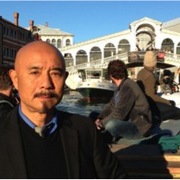Carleton College is pleased to present a special screening of the acclaimed mini-series, “Marco Polo: A Very Modern Journey,” in the Weitz Center for Creativity Cinema January 25 and 29. Shot in epic cinematic style, the three-part series explores the philosophical and historical questions about East and West, then and now, as it contemplates the meaning and implications of Marco Polo’s infamous 13th-century journey from Venice to Beijing. The series follows Carleton professor Qiguang Zhao, Burton and Lily Levin Professor of Chinese, as he travels to Venice to chase the shadow of Marco Polo.
A childhood fascination with the Italian explorer has become a lifelong passion for Professor Zhao. In the three-part film, Zhao seeks out the Marco Polo story, chronicling the people, places, power and perceptions of a Westerner discovering the East centuries ago, and asks what resonance this has for the world today.
While Professor Zhao remains in Venice, searching the libraries and old buildings for clues to the meanings of the Marco Polo story, a young man from Venice, of similar age to the Marco Polo of 1271, sets out to replicate the physical journey, quoting from Marco Polo's books and the contemplations of Professor Zhao. The film recreates the excitement of this epic journey and helps the audience to discover a global meaning for the world today.
The first of the three films in the series, “Another World,” will be screened Sunday, Jan. 25 from 2 to 3:30 p.m. Parts two and three, “Lost Worlds” and “The New World” will both be screened Thursday, Jan. 29 at 7 p.m. All screenings are free and open to the public.
In “Another World,” Professor Zhao imagines Marco Polo’s journey from Venice to the Holy Land, through present day Iraq and Hormuz of southern Iran, and finally to the home of the Assassins of Alamut.
In the second film in the series, “Lost Worlds,” Zhao picks up the journey at the Pamir Mountains on the edge of China, from where Marco Polo follows the Silk Road, down to the forbidding Taklamakan Desert and onto the Mongolian steppe. He makes his way to Xanadu, the heart of Kublai Khan’s power base before reaching ‘Beyond the Cloud,’ the remotest corner of the country.
The culminating film, “The New World,” travels through the heartland of China. From Kublai Khan’s new capital Beijing in the 1270s to the rapid development of the city in the 1990s, Beijing represents the power and economic might of China, then and now, but it is the beauty and sophistication of Hangzhou, the City of Heaven, that captures Marco Polo’s heart and soul.
This event is sponsored by the Carleton College Department of Asian Languages & Literatures. For more information, including disability accommodations, call (507) 222-5437. The Weitz Center for Creativity is located at Third and College Streets in Northfield.



